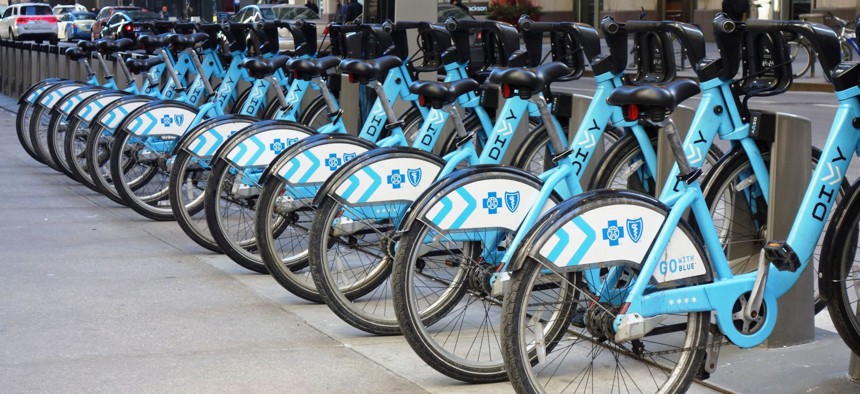Chicago Just Released a Massive Amount of Bike-Sharing Data

A Divvy bikeshare docking station in downtown Chicago. Shutterstock
A new dataset about the Divvy bike-sharing program is now the largest available through the city’s open data portal, with over 52 million rows of information.
The largest dataset the city of Chicago has ever released through its online open data portal went live Tuesday, offering up a vast amount of information about the city’s Divvy bike-sharing program.
Included in the dataset is bicycle and docking spot availability at city bike-sharing stations, recorded in 10 minute intervals, from 2013 up until the present. Also released was every record for Divvy trips in the past two years, according to the city’s chief data officer, Tom Schenk Jr.
Tuesday’s release is the first time bike-sharing data has been published on Chicago’s open data portal, a website that acts as a clearinghouse where city datasets are made publicly available.
Schenk told Route Fifty there has been interest in the bike-sharing data within the city’s civic technology community, and among people interested in transportation issues.
Eventually, he explained, the data could lead to the creation of tools that help Divvy users determine where bicycles, and open docking spots are—or are not—available within the bike-sharing system.
“One of the problems that people are coming across is they try to go, and they try to leave their bike at a docking station, and it's full,” Schenk said. “Maybe there's something in that historical data that can tell you the docking stations that might be full.”
Mayor Rahm Emanuel announced an expansion of Divvy last week, and by mid-summer the system is slated to have over 580 stations, and upwards of 5,800 bikes. According to the Chicago Department of Transportation, nearly 3.2 million trips were logged on the system last year, up from about 2.4 million in 2014. Divvy launched in 2013.
The Chicago Department of Transportation owns the Divvy bikes and stations, and the system is operated by Motivate, a firm formerly known as Alta Bicycle Share.
Motivate had released some data for the system in the past. But the timeframe for the docking station data, Schenk said, was limited compared to what the city has published.
Although the data for Divvy bike and docking spot availability is recorded every 10 minutes, it is refreshed on the city’s portal every hour. Trip data is set to be updated every six months.
As of Wednesday afternoon, the bicycle and docking slot availability dataset had about 52.7 million rows of information.
“I can't see a dataset that we’re going to release that's going to come close to this size,” Schenk noted.
The trips data, meanwhile, featured records for over 6.3 million bike rides.
Jonathan Levy, the city’s open data program manager, pointed out the docking station data is expanding by about 70,000 records per day. In an email he said he thought it was “by far, our fastest growing dataset.”
Derek Eder, lead organizer of Chi Hack Night, a weekly event in Chicago focused on civic technology, applauded the city’s move to publish the bike-sharing data. “It's great that the city is not only releasing it, but releasing it in, sort of, a real-time kind of way,” he said.
Referring to open data more broadly, he added: "It's not useful unless it's timely.”
Eder said he didn’t personally have any projects planned with the bike-sharing data, but that “there's folks at the hack-night that I'm sure are interested in playing around with it.”
He also highlighted projects done using the bike-sharing data that had already been available. These have ranged from 3-D visualizations of trips, to explorations of how weather affected ridership.
In Eder’s view, Chicago is doing well publishing high-quality datasets through its data portal.
“We've learned a lot based on the data that the city has released,” he said. “The county, and even furthermore the state of Illinois, have a lot of catchup to do when it comes to open data.”
The city of Chicago has previously turned to predictive analytics in its attempts to tackle urban problems—such as combatting rats.
Asked if he thought it was a stretch to come up with a predictive analytics model to help Divvy riders locate available bikes and docking slots, Schenk said: "I don't think that takes it too far at all."
While such a project isn’t on the city’s current agenda, Schenk said he’d heard from civic technologists who were interested in developing predictive analytics tools for the Divvy system.
"In part, this is why we released this data publicly,” Schenk said. “So others can take advantage of it and use it how they see fit.”
PREVIOUSLY on Route Fifty:
Bill Lucia is a Reporter for Government Executive’s Route Fifty. He is based in Washington, D.C.
NEXT STORY: Stanford Rape Case Judge Barred From Sex Assault Trial; Chicago Police Commander’s Firing ‘Falls Through’






